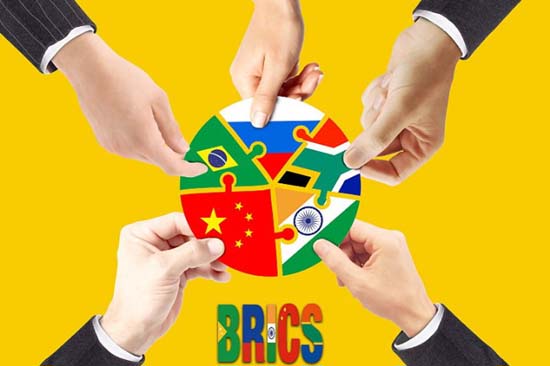China Daily
The BRICS cooperation mechanism has developed a multi-tier, systemic set of institutions that is yielding remarkable progress in key areas, and it could now speak as one voice in the global arena on behalf of emerging markets and developing countries, experts said.
They made the observation as the leaders of the five member states-Brazil, Russia, India, China, and South Africa-will convene virtually on Thursday for the 14th BRICS Summit.
Zhu Jiejin, a professor at Fudan University’s School of International Relations and Public Affairs, said “one of the milestones” in the progress made by BRICS over the past 16 years is the establishment of its New Development Bank and its emergency reserve.
Following its opening in Shanghai in 2015, the bank expanded its membership for the first time last September to include the United Arab Emirates, Uruguay and Bangladesh.
“This symbolizes a major step in the bank marching toward becoming an international multilateral development bank, and it will offer financial support to more emerging markets and developing countries boosting their say and influence in the global financial system,” Zhu said.
Ren Lin, head of the Department of Global Governance at the Chinese Academy of Social Sciences’ Institute of World Economics and Politics, said the BRICS countries have established a collaboration system with a wide spectrum and multiple levels, and it “has made remarkable progress in several critical areas concerning the reform of the global governance system”.
In terms of development, the BRICS countries are deepening collaboration in areas such as fulfilling the United Nations 2030 Sustainable Development Agenda, tackling climate change and advancing green development, she said.
“And in the area of security, the BRICS nations have made their coordination and contacts even closer and mutually respect sovereignty, security and development interests,” she said.
Ren highlighted the synergy of BRICS’ different cooperative agenda items, such as the link between its financing function and sustainable development projects.
“BRICS’ New Development Bank will offer $30 billion in financing over the next five years for member states, and 40 percent of the funding will be used in easing climate change,” she noted.
Chen Fengying, an economist and former director of the Institute of World Economic Studies at the China Institutes of Contemporary International Relations, said the BRICS cooperation mechanism, now led by the annual summit, includes affiliated events such as the annual meetings of foreign ministers, trade representatives, think tanks and forums, forming a well-organized architecture of institutions.
“The mechanism has become a powerful platform for emerging market countries and developing countries to consolidate their consensus and speak out as one voice,” Chen said.
In particular, this mechanism could still function properly even if there were some disagreements among certain members, and they always honor the spirit of inclusiveness, openness and mutual benefit, “drawing a sharp contrast to some cliques pursued by some countries that are based on ideology and hegemony”, she said.
Future tasks
In the midst of the lingering COVID-19 pandemic, inflation, supply chain disruptions and impulses to counter globalization, BRICS should strengthen its cooperation, boost its resilience, develop emerging sectors and counter policy risks brought by other countries, observers said.
Chen said the BRICS nations should further reinforce the New Development Bank, build up its emergency reserve, and do more to bolster developing countries’ financial resilience.
“Also, the five countries should work even closer in cutting-edge areas such as the digital economy and AI-driven production, join hands to secure the safety of production chains and supply chains, closely track global inflation, coordinate macroeconomic policy and tackle post-pandemic recovery,” she added.
Feng Xingke, secretary-general of the World Finance Forum and director of the Center for BRICS and Global Governance, said the BRICS nations should strive for a greater role in global financial governance reform and seek more voting rights and a greater say in key institutions such as the International Monetary Fund.
“To avoid possible sanctions imposed by some Western countries and boost their immunity against external risks, the BRICS nations should seek more local currency settlement among them in the context of international economic cooperation. They could also consider establishing a cross-border payment clearance system to boost their cross-border financing, investment and trade,” Feng said.
Hu Biliang, an economics professor and executive dean of the Belt and Road School at Beijing Normal University, said future BRICS cooperation should be aimed at greater quality, and it should take the opportunities offered by digital technologies and the Fourth Industrial Revolution.
“Only a greater quality of their cooperation could make it possible to effectively advance the United Nations 2030 Sustainable Development Agenda and better translate into reality the China-proposed Global Development Initiative,” he said.
Zhu, the Fudan University professor, said the BRICS nations could take the lead in prompting developed countries to fulfill their commitment to offer more funds, technologies for developing countries and facilitate their capacity buildups.




